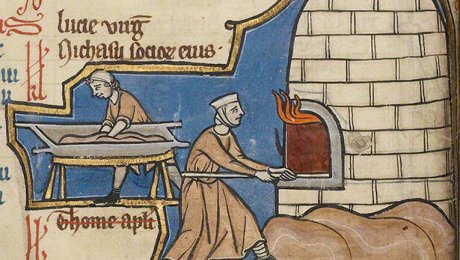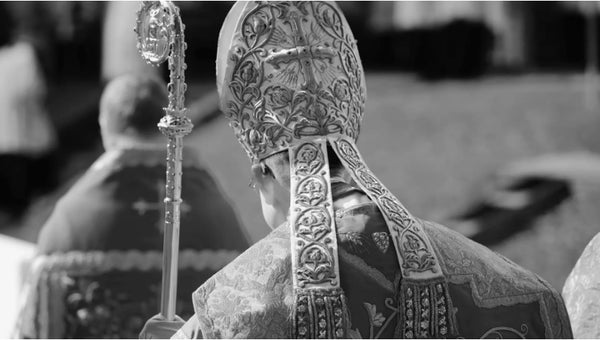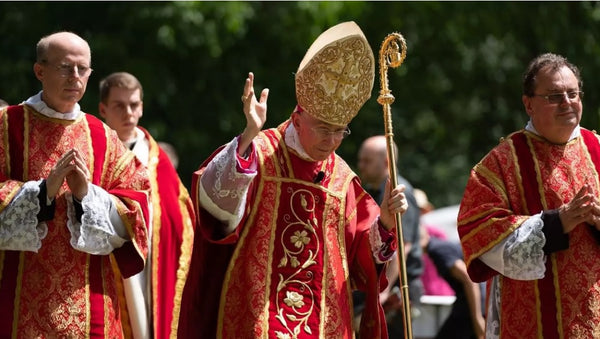Think Lent is Tough? Take a Look at Medieval Lenten Practices

February 21, 2018 District of the USA
The Lenten fast for Latin Catholics living in the years of the third millennium of Christianity often means swapping out the lunchtime burger for a Filet-o-Fish, and attending Stations of the Cross sporadically. But the Church has, up to the time of major reforms in the 1960s, encouraged its children to not do the bare minimum, but to immerse themselves in the spirit of Lenten penance.
The requirements and practices during the first millennium after Our Lord were extraordinarily stringent by today’s terms, having been relaxed bit by bit, until they are almost nonexistent today. Archbishop Lefebvre noted this in a letter written to faithful in 1982:
The faithful who have a true spirit of faith and who profoundly understand the motives of the Church…will wholeheartedly accomplish not only the light prescriptions of today but, entering into the spirit of Our Lord and of the Blessed Virgin Mary, will endeavor to make reparation for the sins which they have committed and for the sins of their family, their neighbors, friends and fellow citizens."
Today, only the Eastern Christian churches (many of which are not in communion with Rome) practice austerity during Lent, albeit unevenly. For instance, meat, fish, dairy, and oil are generally prohibited during the Lenten season, though there are few restrictions on the amount of Lenten-approved food that may be consumed. Moreover, certain fasting disciplines are subject to regional practice and cultural variations with local priests and bishops having more direct say in offering dispensations for those entrusted to their care.
Black Fasts and Watery Beer
We can learn much from our Latin ancestors’ observance of the Lenten Quadragesima and perhaps follow their example; if not entirely in practice, at least in spirit, as recommended by the Archbishop. In a recent post on his site, Dr. Taylor Marshall, a former Episcopalian priest who is now Catholic, collected the rules for Lenten penance as described by St. Thomas Aquinas:
- Ash Wednesday and Good Friday were “black fasts.” This means no food at all.
- Other days of Lent: no food until 3pm, the hour of Our Lord’s death. Water was allowed, and as was the case for the time due to sanitary concerns, watered-down beer and wine. After the advent of tea and coffee, these beverages were permitted.
- No animal meats or fats.
- No eggs.
- No dairy products (lacticinia) – that is, eggs, milk, cheese, cream, butter, etc.
- Sundays were days of less liturgical discipline, but the fasting rules above remained.

Baking Bread (detail) in a psalter by an unknown illuminator, Belgium, mid-1200s. J. Paul Getty Museum
Bread, Salt, Vegetables
Essentially, medieval Western Christians subsisted on bread, vegetables and some salt during Lent. Fish was permitted, though uncommon. This was consistent with the desire of the Church for its faithful to refrain from flesh meat (St. Thomas equates Our Lord giving up His Flesh for us) and to strive for greater control over our own bodies, with abstinence from the marriage act as an additional form of self-mortification.
Beyond the daily penances, the Triduum was more severe than even the “Black Fast” mentioned earlier. The Good Friday fast began as early as sundown on Maunday Thursday, lasting through the noon hour on Holy Saturday – when the early Church performed the Easter Vigil.
But as early as 800 A.D., the 3pm fasting time was generally moved more towards noon. In fact, “noon” is a derivative of “Nones,” the 9th hour of the Divine Office, said at about 3pm. Why do we call 12pm “noon” and not 3pm? During Lent, the monasteries would often move the recitation of nones as early as 12pm, in order to provide the working monks and laborers an opportunity to break their fast earlier in the day. Hence the exclamation by exhausted brothers and laborers of “Nones!” entering the vernacular. A remnant of this shift is still detectable in the rubrics for reciting the Roman Breviary up until the 1960s; None was prescribed to be recited in the morning before Mass.
Cathedrals Built on Dairy
There is some confusion on the matter of dairy—some writings of early monks in the 6th century mentioned the taking of milk during Lent. Whether rules fluctuated or this was simply because of lack of any other food is unclear. But at least by the time of St. Thomas Aquinas in the 13th century, this was a norm.
It is interesting to note, however, that records dating back to 900 A.D. show that German Catholics could receive permission to consume dairy in return for good works, or a contribution to a pious work – known as Butterbriefe. Several churches are said to have been partially built by the proceeds of such exemptions. One of the steeples of Rouen cathedral was for this reason known as the "Butter Tower."
This general prohibition of eggs and milk during Lent is perpetuated in the common custom of blessing or making gifts of eggs at Easter, and in the English usage of eating pancakes on Shrove Tuesday – a way to use up the eggs and milk before the Lenten fast. Hence the colloquial term still used by some today of “Pancake Tuesday.”
From Watered-Down Beer to Watered Down Penance
Gradually, papal indults would give way to an abrogation of these fasting rules on Sundays, and the allowance of meat at least once on all the days of Lent except Fridays and Ash Wednesday.
A small meal after the main “break fast” at Nones was eventually allowed in the evening, during which Cassian’s book Collationes was read, giving rise to the term "collation" used for the small snack allowed during fast days.
Finally, Pope Paul VI’s Apostolic Constitution Paenitemini reduced Lenten practice to two lines: No meat allowed on Fridays in Lent, and 1 meal with 2 collations allowed on Ash Wednesday and Good Friday.
While Archbishop Lefebvre did not recommend a reverse to the practices of the 13th century, we can certainly take his words as encouragement to follow a more strict observance of the spirit of Lent.
Would we dare to say that this necessity is less important in our day and age than in former times? On the contrary, we can and we must affirm that today, more than ever before, prayer and penance are necessary because everything possible has been done to diminish and despise these two fundamental elements of Christian life.”
Sources: Dr. Taylor Marshall - Catholic Encyclopedia - sspx.org - 2018-02-21
Also in News from Tradition

Interview with the Superior General of the Priestly Society of Saint Pius X
“Suprema lex, salus animarum”
“‘The supreme law is the salvation of souls.’ It is upon this higher principle that, ultimately, the entire legitimacy of our apostolate depends.”

Death of Bishop Bernard Tissier de Mallerais

Prayer Intention for Bishop Tissier de Mallerais
We ask for prayers for His Excellency Bishop Tissier de Mallerais.
On the morning of Saturday 28 September, after the Angelus, he fell on the stairs of the seminary in Ecône and lost consciousness. He is currently in hospital.

Angelus Press
Author